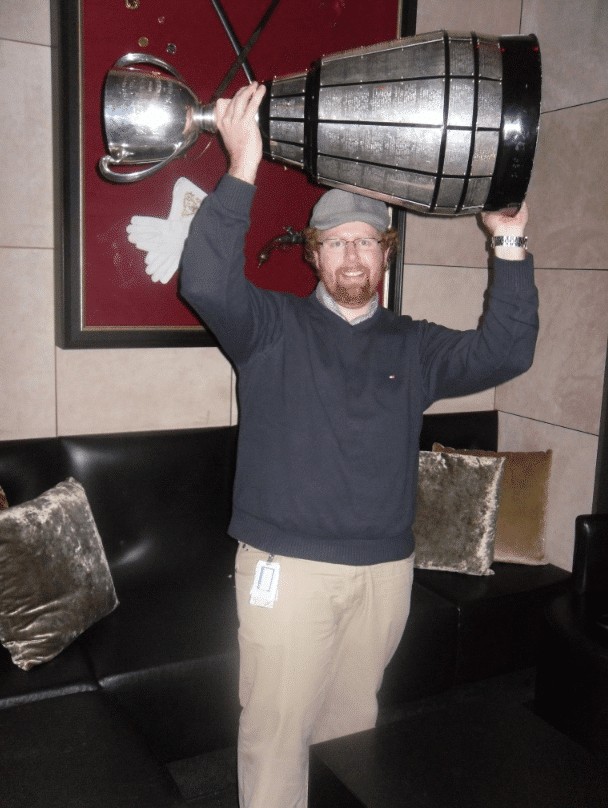Hamilton Bulldogs Senior Director Of Ticketing Darren Arnold Shares The Importance of Giving Back

Hamilton Bulldogs Senior Director Of Ticketing Darren Arnold Shares The Importance of Giving Back
Darren Arnold is the Senior Director of Ticketing for the OHL’s Hamilton Bulldogs. Throughout his career, Darren has worked across North America pursuing roles not only with the Bulldogs but also the Toronto Blue Jays and the Aspire Group. Although Darren’s various roles in the sports industry have granted him amazing opportunities, he believes the most valuable experiences are those that he can provide his staff. Darren truly believes in helping those who are up-and-coming in the sports industry, lending his knowledge through speaking to students and providing opportunities such as the annual Hamilton Bulldogs Careers in Sport Conference. The insights Darren shares are valuable to anyone pursuing a career in the sports industry; continue reading to see the advice Darren has to offer!

Please note: The interview with Darren Arnold was conducted via a typed conversation. Editing changes were made to make it easier to read while maintaining the voice of the interview.
Tell us about your role as the Senior Director of Ticketing of the Hamilton Bulldogs.
My primary role with the Bulldogs to oversee our ticketing initiatives and our sales and service staff on the ticketing team. This role lends itself to other aspects of our business as well including staffing, training, managing and maintaining a budget and assisting our marketing team as well. With a small team everyone tends to step outside their respective silos to assist other departments that are not immediately within your scope of work.
I directly oversee a Senior Manager, a sales team of three and usually a handful of interns throughout our season. In this role, you are constantly determining ways to drive ticket revenue through our outbound sales efforts while balancing the proactive efforts with maintaining our season ticket base, groups, partial package holders and individual buyers.
In recent years there has been a shift in our industry to better collect, interpret and use data to make business decisions and we’re no different in that pursuit of more robust consumer insights. We are constantly determining new ways to interact with our fans via traditional and non-traditional means and these are key parts of the role that are vital to our departments success that you wouldn’t see listed on a job description.
What does a typical day look like for you?
No two days are truly alike, which I’ve always preferred. While I enjoy the structure of routine meetings and set tasks and deadlines being in leadership you never truly know what you may encounter on any given day. The role changes seasonally between in-season and off-season with the hours fluctuating between both. With junior hockey being primarily a “weekend league” I’m usually at 90% of our home games through the course of the season and playoffs. I’ve never been the type of person to count my hours because I’m passionate about my chosen profession, but I’d use that as a cautionary tale to anyone starting out in this industry. The hours can be long, and you often must give up weekends and perhaps miss a social event or two along the way. When you are doing something you love and you find a genuine desire to want to be at games, or at events or at the office long past a traditional 9 to 5 role then you know you are in the right place.
What is the best part of your position, and why?
I get asked this question a lot and I’m blessed as I’ve been lucky to be a part of many special moments throughout my career. I’ve witnessed rare sporting feats, surpassed goals and seen championships won but nothing truly compares to promoting one of your staff or seeing them progress and excel in their respective careers. In fact, it’s not even close for me. I’ve held a firm belief that we are in the people business and that extends past our providing our fans the best and most affordable entertainment options available. When I say people business, I truly want to see my staff grow and I’ve always found immense enjoyment in mentoring staff as they navigate their careers. I routinely speak to university classes about what it’s like to work in sports. In that presentation I have a slide answering this very question with a dozen headshots of past and present staff who are now in leadership positions in Canada and the United States. This has always been one of the aspects that I’ve relished is to be able to coach and mentor in my role.

What is something people don’t realize about working in the sport industry?
This industry is incredibly small.
There is a sense of brotherhood among those in the industry. While you have rivalries with friends between respective opponents you can still rely heavily on industry peers for advice, insight and best practices long after the final whistle.
“While I have only ever known what it’s like to work in sports and predominantly professional sports, I say there with confidence there is often a sense of sharing as well unlike anything I’ve ever seen. I can contact a team or league and ask for a key contact who has worked on a specific project or initiative and often the individual spearheading said project is always open to sharing ideas.”
This extends to relationships and reputation that I’ve spoken to a few times throughout this interview that building relationships and networking is vital to your success. It’s not just adding LinkedIn connections or getting business cards and emailing when you want something but truly building a lasting relationship with your peers both in and out of your organization is paramount.

What are three essential skills someone needs to succeed in the sport industry?
1 Communication Skills
Unfortunately, as our communication tools advance rapidly, we often sacrifice the invaluable skills such as how we communicate face-to-face. As I would suspect my audience for this to be of those breaking into the industry the one thing, I continually have noticed in recent years is the unfortunate decline in communication skills. In interview settings, the interviewer lacks engagement, doesn’t ask enough (or any) questions and displays poor etiquette in their email dialogue before or after an interview. I can respect what text messaging is done with how we communicate with each other, but good old-fashioned conversations will never lose their luster either. Get out from behind the computer or your phone and try calling someone or going for a coffee for a change this is where building a relationship truly begins.
2 Managing Expectations
For those who know me well I akin this to control what you can control. In sports, especially in sales wins are always great but we can’t control that. Sport is one of the most unique products in the world in that you can’t control the end result. As such, we don’t plan our goals around the success (or presumed failure) of a team. We can control the fan experience, engagement, interactions and this is where we focus our energy the most. This extends to so many other aspects of life professionally and personally as well and not a day goes by where I don’t employ this thinking.
3 Sense Of Charity
I was going to write building relationships but that has flowed consistently throughout so I’ll add a new layer here. Give back. I relish the chance to take part in interviews like this because my hope is that I take something I’ve learned from my experiences and somewhere out there a reader will take my thoughts and apply it to their own situations. We often take for granted the things we get to see and do daily but so many fans out there would do anything to see a few moments of our days through our eyes. Grant them this chance every so often. This quote sits on my desk and I felt it was fitting here.
You can have everything in life you want, if you will just help other people get what they want.
– Zig Ziglar

What advice would you give to someone starting out their career in the sport industry?
I feel I could provide a lengthy response here, so I’ll do my best to be succinct in my suggestions. Getting out of your comfort zone and pairing that with managing expectations are the two most glaring to me. My career path is a long winding road with many stops and roles along the way. There is no true set path from point A to point B and I’ve always found that what may seem scary and daunting at the onset is usually where I’ve learned the most from when I look back at it.
As I interview individuals on a regular basis, I’ve noticed it’s become exceedingly rare to find that someone who is so incredibly eager to relocate or step outside of their boundaries to try a role. Too often now I see (or hear) the I want to work in marketing, or be an agent or be a GM and in response when I say the Toronto (name your team, as an example) are hiring entry level marketing coordinators you should take a look the response is, “Well I don’t want to go too far from home.”
My heart sinks when I hear this.
If you wish to limit your pursuits to a 50km radius from where you grew up you may, while not impossible, find it incredibly challenging to find your dream job. Further to this, when I ask about what they’ve done to put themselves on the best path to becoming a GM I’ll hear, “Well I watch a lot of hockey and I’ve been a big fan my whole life.”
I promise I come from a good place and don’t wish to be the career advice boogeyman, but nothing is going to be given to you in this industry (or any other for that matter) just because. I appreciate the shift in recent graduates’ desires to be GM’s and agents and I say this not to stifle your dreams, but my advice is to be understanding of different paths to those roles and be willing to take them.
My career has taken me from accepting a co-op internship in Medicine Hat, Alberta to full-time roles in Ottawa and Toronto, Ontario to Atlanta, Georgia and Springfield, Massachusetts to home in Hamilton, Ontario where I grew up. All of the previous geographic positions were the correct career steps for me but that’s just the point in that I was certainly nervous to move to a new country but that’s where life and learning happens when you are in those moments of uncertainty.
Very long story short is that whatever role you have desire to be the very best at it. I’ve worked with individuals who started in ticket sales and ended up as scouts and GM’s and I’ve seen individuals who hated football and didn’t grow up understanding it or playing it hoist the Grey Cup trophy in the CFL with a huge smile across their face. Point being, I think it’s important to have a plan to where you want to go but being ok with deviating from that plan while keeping an eye on your career aspiration. Afterall, no one in this industry took a linear path to get to where they want to be so don’t be afraid to a leap of faith every so often as you navigate your career.

Would you say your path to your current position was quite easy or rather challenging, and can you discuss why?
I don’t feel as if my path was easy at all. I don’t think anything you pursue should come easy and that you should embrace the challenges along the way.
I’ve always been the type of person who was willing to pack up and try a new experience if I felt I could grow personally and professionally from it. Over the course of my 15+ year career I’ve lived in two provinces, two states and six different cities and had the luxury (at times) of travelling routinely to a variety of places. For some, they would envy the life of hotels and airports but the one aspect to keep in mind is that it is your employment and not a vacation and this is where I truly learned my time management and organizational skills was from having to allocate each minute to accomplish my tasks.
I feel as you navigate your career you must define what’s most important to you – a checklist of sorts and what are your “must haves” for a work environment. The more boxes that are checked for you then the better fit it will be for you while constantly having an eye on how this will fit into your path to your dream role. And one thing to be reminded of is that sometimes those boxes may be checked halfway across the country and if that’s the case – pack your bags.
For me, some of those boxes were (and always will be) the type of leader I will work for. Can they coach me and motivate me on my terms? What is the office culture like? Are there peers that I can work with and trust to accomplish their goals, but also will they laugh at my bad jokes? What is the reputation of the organization/team? Do they have a track record of internal growth and strong hires in the past or is it in a state of constant turnover? One thing to notice as I share my checklist, I don’t include salary and earnings potential, I don’t share job titles and I most certainly don’t have any interest on how much player interaction with the players I’ll have. It’s rare to find a role that will check every box for you personally or professionally but what are you willing to sacrifice (or not sacrifice) for you to thrive in your role? Ask yourself what’s most important to you because this will forge the foundation for where you can go in your career.

Hayley's Final Thoughts
Interview by Hayley Michie


